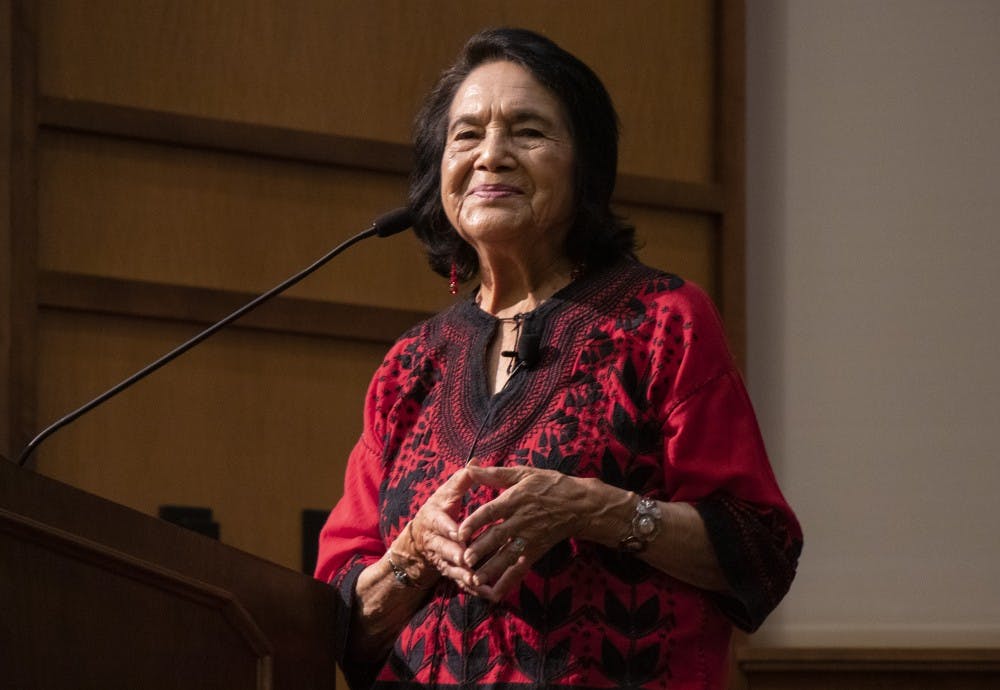Latinx Heritage Month comes to an end tomorrow. The month recognizes the contributions and influence of Hispanic Americans on the United States of America’s culture, history and achievements.
“It’s a time to celebrate the many contributions of the Latinx community in the country. For me, it’s a time to focus on what historian Vicki Ruiz has said, ‘Latino history is U.S. History.’” said professor Sylvia Martinez, associate professor in the Department of Educational Leadership and Policy Studies.
The Latinx community in the U.S. is very diverse and people tend to forget that, Martinez said. She said this month was very exciting, even though the pandemic made it difficult for people to gather as a community.
“This means that Latinos/Latinas are an integral part of the formation of the United States,” Martinez said. “This month is an opportunity to learn that. I also love that we see a lot of cultural celebrations during this time — when we can learn about the diverse foods, music and styles of dress.”
Junior Evelyn Sanchez, co-president of Latinos Unidos at IU said having a month that celebrates her heritage lets her be prideful in her culture. She is part of a community that deserves recognition for for its achievements in the U.S.
“I celebrate my culture every day of my life,” Sanchez said. “I am forever proud to be Latina. As a community, we like to use this time to reflect on how our community is doing and what we have accomplished to continue being proud of our impact.”
Senior Sofia Godinez said Latinx Heritage Month is a great reminder for the Latinx community to celebrate their history and culture.
“It is nice to take the time to reflect and be with others who share the same culture as me,” Godinez said.
With Latinx Heritage Month coming to an end, it is vital to share stories of Latinx Americans who helped fight for their people's rights. Dolores Huerta is one of these icons. She is a civil rights activist and American labor leader, who along with César Chávez, founded the National Farmworkers Association now known as the United Farm Workers.
Born in the mining town of Dawson, New Mexico, on April 10, 1930, she was inspired by her mother, Alicia Chávez, to advocate for farm workers later in her life.
“She’s a civil rights champion, spending most of her life fighting for better work and life conditions of farm workers, and other marginalized groups,” Martinez said. “We forget that she was a co-founder of the farm workers union and that she was a fierce negotiator.”
Although Huerta has received numerous awards for her activism for women's rights, workers' rights, immigrants' rights and LGBTQ+ rights, she faced a lot of sexism and racism during her prime years as an activist in the 1960s.
Her fight for acceptance came with scrutiny from the public and her fellow activists. She was constantly criticized and humiliated for her multiple marriages and family structure, specifically for never being at home to take care of her 11 children.
Reporters would constantly ask her why she does not have the average woman’s dream of going shopping and attending social gatherings. Even after the death of her fellow activist César Chávez, she was not given the presidency of the National Farmworkers Association, an organization she co-founded with Chávez.
Despite all she faced, she was still motivated to bring change in her community, and became a huge supporter of the feminist movement. Sanchez said she showed Latinas that they too can be empowering and no one could silence them.
“She went through so much criticism only because she was a woman, ” Sanchez said. “She showed the importance of intersectionality in activism. She taught us to not let machismo (toxic masculinity) get in the way of the things we want to achieve.”
Huerta visitedIU-Bloomington on Sept. 19, 2019. She was celebrated and welcomed greatly by activists and the Latinx community during her visit.
“One of the most powerful things she said during her visit, I thought, was that the power is in our person. That is, she suggested that despite marginalization, we have power in some shape or form.” Martinez said. “I also got the sense she recognized that not all are willing and able to protest as publicly as she has but that everyone can do something – however small.”
Huerta is an underappreciated hero and more people need to know about her life, Martinez said. She also recommended watching the documentary "Dolores", to learn more about her life and activist career.
“Dolores Huerta is a great role model,” Godinez said. “She has encouraged me to fight for what I believe in and stand up for myself no matter what. Her fight for equality is really inspiring and I am glad that we continue to celebrate and praise her accomplishments today.”
Sanchez called Huerta an icon, and wishes that other people would learn more about Latinx figures and their accomplishments,She said it's sad that Latinx history is so hidden.






